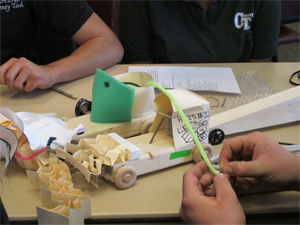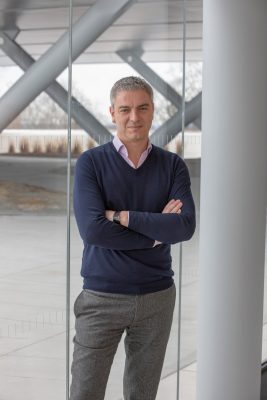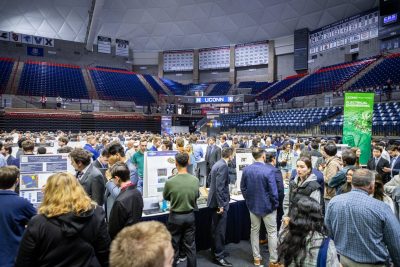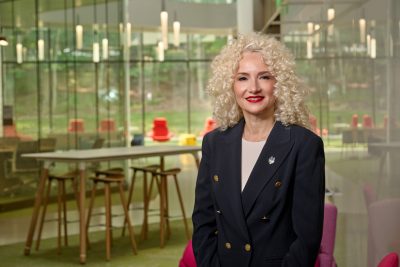Republished with permission from Momentum, a School of Engineering electronic publication.
On Thursday, May 30th, UConn’s GK-12 program hosted the second annual Engineering Design Challenge Competition, involving student teams from Connecticut’s Technical High School System, at the Storrs campus. The theme of this year’s competition was “Reverse Engineering Egg Crash Car.”

In the good-natured competition, the student teams were required to apply core engineering principles in a deceptively simple, fun and engaging way while pitting their engineering knowhow against that of other Tech School students. The participating teams were the top performers in contests held at their home Tech Schools.
In the Egg Crash Car competition, the teams were charged with building a racecar – using only the materials provided – capable of safely transporting an uncooked egg through a variety of challenges without the precious cargo breaking.
Among the materials available were Ziplock® bags, wheels, balloons, straws, pom-poms, mouse traps, fishing line, tape, poly-fill stuffing, cotton balls and rubber bands. These raw materials produced a variety of vehicles, from sleek rectangular entries to zany-looking “Mad Max” style vehicles adorned with cotton-ball armor. For each vehicle, it was stipulated that the egg “passenger” had to be removable.
The GK-12 Fellows designed three rigorous tests for the vehicles: a rear impact test, in which a suspended wooden mallet was released from three different angles into the rear of the vehicle; a rollover test, in which vehicles were released at different angles from the top of a four-foot plane; and a head-on collision test, in which CO2 canisters were attached to the rear of each vehicle as a propulsion system that carried the vehicles into a cinderblock wall. For each test, the aim was to keep the vehicle and its egg cargo intact. Other criteria included the vehicle production costs, speed and structural integrity.
In the end, the Tech School students enjoyed a fun day of friendly competition and came away with a better appreciation of core engineering concepts such as performance-based testing, tradeoffs between material cost and quality and the iterative and challenging nature of the design process.
The competition brought together teams from the Academy of Engineering and Green Technology, Howell Cheney Technical High School, Harvard H. Ellis Technical High School, E.C. Goodwin Technical High School, Ella T. Grasso Southeastern Technical High School, Norwich Technical High School, A.I. Prince Technical High School, Vinal Technical High School, and Windham Technical High School.
The teams – along with fellow students who did not compete – were mentored throughout the 2012-13 academic year by UConn Engineering doctoral candidates who are committed to helping introduce engineering concepts in Tech School classrooms. The 2012-13 GK-12 Fellows included Juan Pablo Correa Baena (Environmental Engineering); Lu Han, Andrea Kadilak, Joseph Parisi and Rebecca Rubinstein (all in Chemical Engineering); Justin Roller and Michael Zilm (Materials Science & Engineering); and Lou Bachenheimer and Nick Curtis (Mechanical Engineering).
The GK-12 (Graduate STEM Fellows in K-12 Education) program is an innovative educational program sponsored by the National Science Foundation. It aims to provide teaching resources (in the form of graduate students in the engineering sciences) to classrooms in the state of Connecticut Technical High School System. Dr. Doug Cooper is the Principal Investigator of UConn’s GK-12 program.
 Dr. George Bollas, an assistant professor in the Department of Chemical and Biomolecular Engineering, is the recipient of a prestigious ACS Petroleum Research Fund Doctoral New Investigator Award. The ACS PRF programs support innovative research in the petroleum field and promote the development of promising engineers and scientists. The award program provides career opportunities to young faculty and their undergraduate and graduate students by supporting advanced scientific research. The goals of the American Chemical Society Petroleum Research Fund are to support fundamental research in the petroleum field and develop the next generation of engineers and scientists through the support of advanced scientific education.
Dr. George Bollas, an assistant professor in the Department of Chemical and Biomolecular Engineering, is the recipient of a prestigious ACS Petroleum Research Fund Doctoral New Investigator Award. The ACS PRF programs support innovative research in the petroleum field and promote the development of promising engineers and scientists. The award program provides career opportunities to young faculty and their undergraduate and graduate students by supporting advanced scientific research. The goals of the American Chemical Society Petroleum Research Fund are to support fundamental research in the petroleum field and develop the next generation of engineers and scientists through the support of advanced scientific education.
 During a gala event on May 2 at the Storrs campus, the School of Engineering honored 10 exceptional alumni and friends as 2013 inductees into the UConn Academy of Distinguished Engineers. Nearly 100 attendees helped to honor the new inductees, each of whom spoke of the profound influence of UConn Engineering in shaping their careers. One inductee was an alumnus of the Chemical Engineering department, John Prior.
During a gala event on May 2 at the Storrs campus, the School of Engineering honored 10 exceptional alumni and friends as 2013 inductees into the UConn Academy of Distinguished Engineers. Nearly 100 attendees helped to honor the new inductees, each of whom spoke of the profound influence of UConn Engineering in shaping their careers. One inductee was an alumnus of the Chemical Engineering department, John Prior.